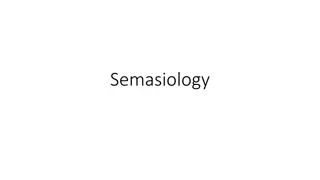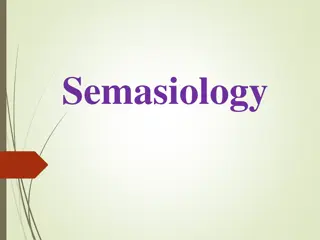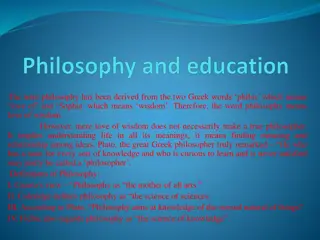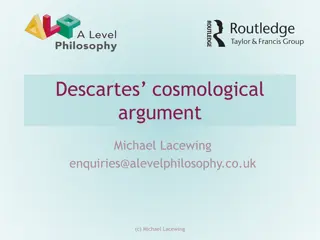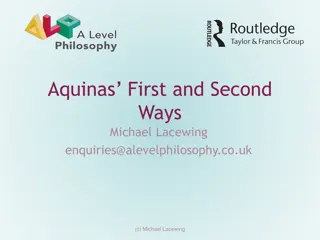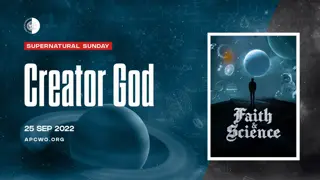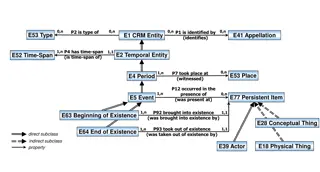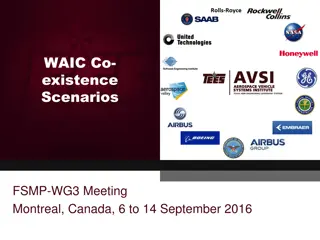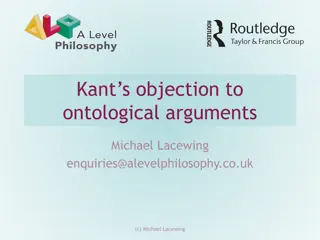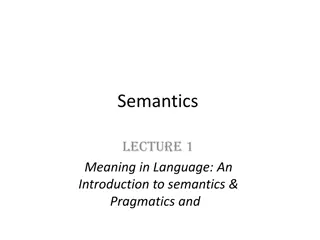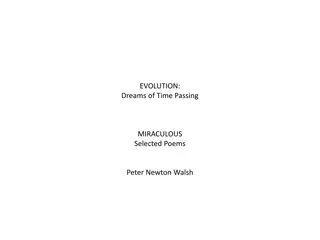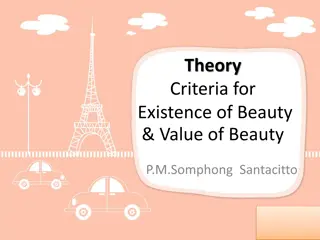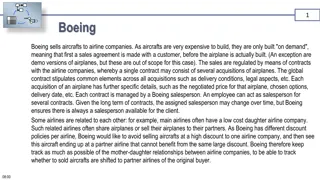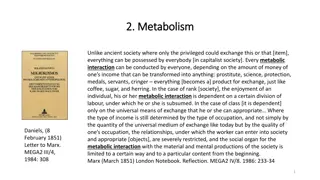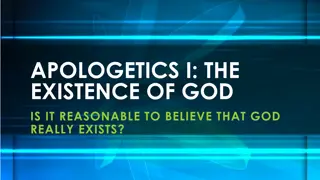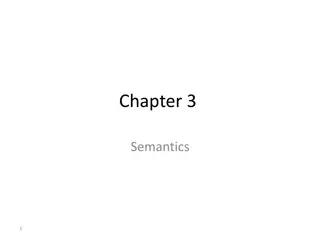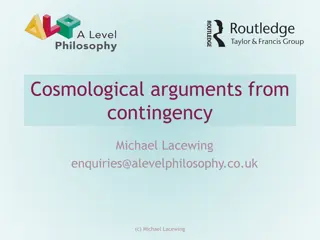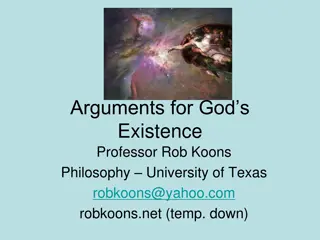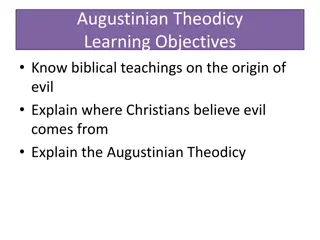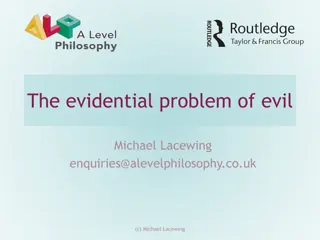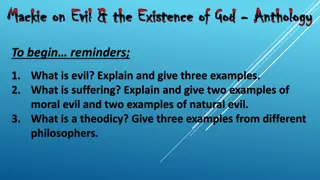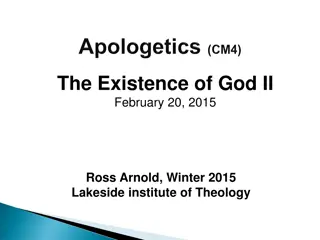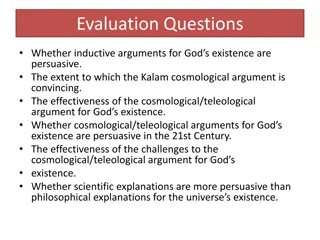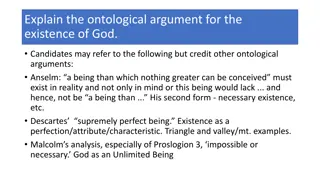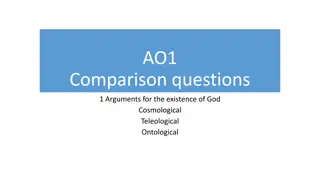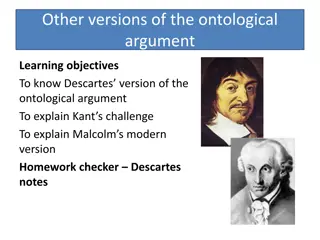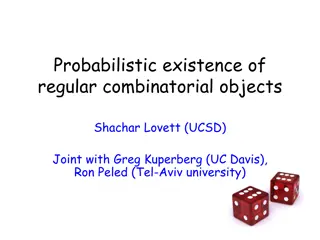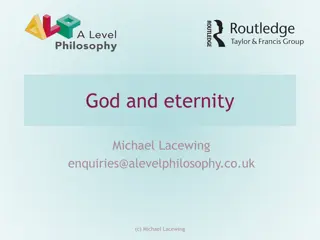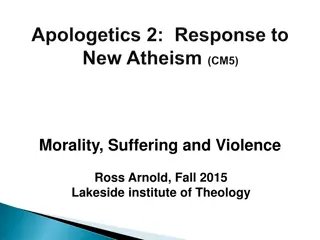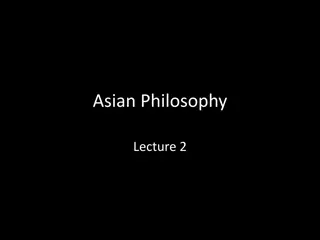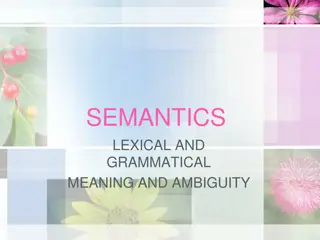The Semantic Argument for the Existence of God - International Conference Insights
Explore the Semantic Argument and its implications for the existence of God as presented by Emanuel Rutten at the International Proofs of God's Existence Conference. The lecture delves into universal properties, formal versus non-formal properties, and the likelihood of God's existence based on thes
0 views • 14 slides
Understanding Semasiology: The Study of Word Meaning
Semasiology is a branch of linguistics focused on the meaning of words. It delves into various aspects of lexical meaning, semantic development, polysemy, and semantic structure. Through exploring types of word meanings and semantic changes, semasiology helps us comprehend the intricate nuances of l
4 views • 19 slides
Understanding Semasiology: The Study of Meaning in Language
Semasiology, a branch of lexicology, focuses on the study of meaning in language through different approaches such as the referent approach and functional approach. The referent approach links the sound form with the concept denoted by the word, while the functional approach emphasizes the relations
2 views • 15 slides
Understanding the Essence of Philosophy: Love of Wisdom and Pursuit of Knowledge
Philosophy, derived from Greek words meaning "love of wisdom," encompasses a deep understanding of life's meanings and the interconnections among ideas. It is more than mere curiosity but a pursuit of knowledge encompassing all aspects of existence and truth. Indian philosophy views it as a vision o
0 views • 6 slides
Descartes' Cosmological Argument and Existence Inquiry
Descartes presents a cosmological argument questioning the existence of anything, focusing on what causes his own existence. He explores different aspects such as perfection, dependency, and the idea of God as a necessary cause for existence. Challenges about the nature of continued existence are al
0 views • 17 slides
Exploring the Existence of God: A Quranic Perspective
Delve into the discussion on the existence of God from a Quranic viewpoint, examining terminology, claims, logical and scientific evidence, atheism reasons, and Pascal's wager. The text explores the Quranic statements on the originator, creation out of nothing, and the origin of the universe, presen
0 views • 40 slides
Exploring Aquinas' Arguments for the Existence of God
Aquinas presents compelling arguments for the existence of God through the First and Second Ways, highlighting the necessity of a first cause and sustaining causes in the world. By delving into concepts of temporal and sustaining causes, Aquinas builds a philosophical framework that leads to the con
6 views • 16 slides
Exploring the Existence of a Creator God and the Design of the Universe
Reflecting on biblical verses and scientific findings, this content delves into the concept of a Creator God and the intricate design of the universe. From the creation of the heavens and the earth to the fine-tuning and complexity of the universe, various perspectives are presented to contemplate t
1 views • 27 slides
Understanding Temporal and Spatial Information Models
This content delves into the intricacies of temporal and spatial information models, covering concepts such as existence, presence, and spatiotemporal relationships. It explores how entities are identified, events are witnessed, and durations are defined within these models. The interplay between ti
3 views • 9 slides
Aviation Co-existence Scenarios at FSMP-WG3 Meeting in Montreal, Canada
Explore the co-existence scenarios discussed at the FSMP-WG3 Meeting in Montreal, Canada, focusing on airport stand interference analysis, victim aircraft scenarios, and landing scenarios. The dimensions, geometry, and guidelines from the IATA Airport Development Reference Manual highlight the safet
11 views • 4 slides
An Examination of Ontological Arguments for God's Necessary Existence
Various ontological arguments, such as Malcolm's and Anselm's, propose that the existence of God is logically necessary, grounded in the concept of God as the greatest possible being. These arguments challenge the coherence of the concept of God and counter objections, like Kant's claim that existen
2 views • 10 slides
Meaning and Meaning-making in Big Q Qualitative Research
Qualitative research explores different understandings of meaning and meaning-making, providing researchers with tools, techniques, and values. Big Q qualitative research focuses on the active role of words in creating meaning beyond reflecting experiences. This lecture series delves into the founda
1 views • 20 slides
Kant's Critique of Ontological Arguments
An exploration of Kant's objection to ontological arguments, examining the flaws in the reasoning of Anselm and Descartes. Kant argues that existence is not a predicate and does not enhance the concept of a being. Therefore, ontological arguments cannot prove the existence of God solely through conc
0 views • 7 slides
Reflections on Death and Existence: A Philosophical Perspective
Philosophers have long debated the concept of death, considering it as a propitious misfortune or an inevitable end that deprives individuals of future experiences. Whether viewed as a divine decree or a statistical marvel, the existence of human life adds complexity to the evaluation of death's inh
0 views • 16 slides
Exploring the Meaning of Life and Living Well
Delve into the profound questions of human existence, personal challenges, and making the most of life through meaningful choices. Understand different perspectives on life and the pursuit of a fulfilling existence in the face of obstacles and uncertainties. Reflect on the ideal versus the reality g
0 views • 14 slides
Understanding Adult Learning and Development
Explore the concept of adult learning and personal development through informal and formal contexts. Dive into the significance of meaning-making and experiential learning in shaping our existence. Understand the evolving complexity of meaning-making systems in the journey of adult development.
1 views • 20 slides
Introduction to Meaning in Language: Semantics & Pragmatics
Meaning in language is explored in this introductory lecture, covering aspects such as communication, semiotics, linguistic channels, and approaches to studying meaning. The process of encoding messages, signal transmission, noise interference, and decoding are discussed within the context of commun
0 views • 19 slides
Reflections on Nature and Time: A Collection of Poems by Peter Newton Walsh
Delve into the profound musings on nature, time, and human existence through the selected poems presented in "EVOLUTION: Dreams of Time Passing," "Miraculous," "September Song," "Requiem for a Redwood," and "Take this Moment." These poems beautifully encapsulate the marvels of life, the fleeting ess
0 views • 21 slides
The Theory of Beauty and Criteria for Existence
Understanding the criteria for the existence of beauty encompasses different philosophical perspectives such as Materialism, Idealism, and Dualism. Materialism posits that everything is composed of material, while Idealism asserts that reality is fundamentally mental or immaterial. The debate on the
0 views • 47 slides
Boeing Aircraft Sales Management System
Boeing sells aircraft to airline companies through contracts managed by salespersons. Contracts consist of multiple aircraft acquisitions with specific details such as price, options, and delivery dates. Boeing tracks relationships between airlines to avoid selling at high discounts to one airline a
0 views • 28 slides
Philosophers' Views on Religious Experience: Insights and Critiques
This lesson delves into the perspectives of various philosophers such as Rudolph Otto, Richard Swinburne, John Hick, and Michael Persinger on religious experiences. It explores concepts like the numinous, religious knowledge, God's existence, and criticisms on the validity of religious experiences.
0 views • 7 slides
Exploring the Problem of Evil and Free Will Defense: A Study Set
This at-home study set delves into the philosophical question of whether the existence of evil conflicts with the existence of God, alongside the free will defense. Drawing on research by Erik J. Wielenberg, students will engage with key questions, objections, and deepen their understanding of the p
0 views • 6 slides
Understanding Metabolic Interaction in Society
In a capitalist society, metabolic interactions and exchanges are influenced by one's income and occupation quality. This separation between human existence and nature is emphasized in the relation between wage labor and capital. Marx's writings highlight how labor is essential for the metabolic int
0 views • 6 slides
The Reasonable Belief in the Existence of God – Apologetics Explained
Apologetics delves into logically defending the existence of God against critics. It explores various methods of proving God's existence, including science, philosophy, personal experience, and legal/historical approaches. The concept of defining God as supernatural, intelligent, personal, and purpo
0 views • 27 slides
Understanding Semantics: Exploring Types and Dimensions of Meaning
Explore the complexities of semantics by delving into the types and dimensions of meaning. From descriptive to non-descriptive meaning, learn how the normality profile of linguistic items contributes to their overall meaning. Distinguish between semantic and grammatical anomalies and discover the nu
0 views • 32 slides
Cosmological Arguments from Contingency Explained
Explore the concept of necessary and contingent existence, Aquinas' Third Way argument for the existence of God, objections to the causal principle, and the idea of a series of contingent things. Contemplate the question of why anything exists and whether God provides the answer.
0 views • 16 slides
Arguments for God's Existence - Prof. Rob Koons' Insights
Explore philosophical and scientific arguments for the existence of God presented by Professor Rob Koons from the University of Texas. The discussion covers the Thomistic argument, the Kalaam argument, and evidence supporting a supernatural cause for the universe, along with references to works by o
0 views • 51 slides
Understanding Augustine's Theodicy and the Origin of Evil in Christianity
Augustine's Theodicy is a philosophical attempt to justify God's existence despite the presence of evil in the world, rooted in biblical teachings on the origin of evil and human free will. This theodicy explores how Christians perceive the existence of evil, how it relates to sin and redemption, an
0 views • 16 slides
The Evidential Problem of Evil: A Critical Analysis
This discussion delves into the complex philosophical arguments surrounding the problem of evil, examining how the existence of evil intersects with the traditional attributes of a supreme deity. It explores the logical and evidential dimensions of evil's existence in relation to God's omniscience,
0 views • 16 slides
Mackie on Evil & the Existence of God: The Problem of Evil
Mackie, known for defending atheism, argued that the problem of evil challenges monotheistic religions. He critiqued the free will defense, claiming that God's attributes of omniscience, omnipotence, and goodness conflict with the existence of evil. The anthology explores different perspectives on e
0 views • 6 slides
Philosophical Apologetics: Arguments for the Existence of God
Philosophical apologetics presents various arguments for the existence of God, including the ontological, cosmological, teleological, moral, transcendental, and presuppositional arguments. These arguments cover diverse aspects such as change, causality, design, contingency, miracles, consciousness,
0 views • 10 slides
Evaluating Arguments for God's Existence in the 21st Century
Exploring the persuasiveness of inductive arguments for God's existence, assessing the Kalam cosmological argument, and evaluating the effectiveness of cosmological/teleological arguments. Delving into whether scientific explanations surpass philosophical ones, the strengths and weaknesses of these
0 views • 16 slides
Ontological Argument for God's Existence and Challenges
The ontological argument posits that a being than which nothing greater can be conceived must exist in reality, not just in the mind. Critics challenge this argument, citing issues with defining God and debating whether existence can be a characteristic. Gaunilo and Kant present criticisms focusing
0 views • 30 slides
Comparison of Arguments for the Existence of God
The comparison explores the Cosmological, Teleological, and Ontological arguments for the existence of God. It delves into the similarities and differences between key proponents such as Aquinas, Paley, William Lane Craig, and Tennant. Each argument is examined based on its form, empirical evidence,
0 views • 10 slides
Exploring Different Versions of the Ontological Argument
This content delves into various versions of the ontological argument, including Descartes' and Kant's perspectives. Descartes sought to prove God's existence through reason alone, emphasizing the innate conception of a supremely perfect being. The challenges posed by Kant and Malcolm to this argume
0 views • 24 slides
Probabilistic Existence of Regular Combinatorial Objects
Shachar Lovett from UCSD, along with Greg Kuperberg from UC Davis, and Ron Peled from Tel-Aviv University, explore the probabilistic existence of regular combinatorial objects like regular graphs, hyper-graphs, and k-wise permutations. They introduce novel probabilistic approaches to prove the exist
0 views • 46 slides
Exploring the Concept of Eternal Being and Timelessness
Delve into the intriguing discussion on eternal being and timelessness, examining the nature of God's existence outside of time and the distinctions between everlasting and eternal existence, as pondered by philosophers like Boethius. Explore the unique characteristics of an eternal being, the conce
1 views • 10 slides
The Debate on Objective Morality: The Atheistic Perspective
The discussion delves into the concept of objective morality and its relation to religious beliefs and atheism. It explores why most people believe in objective morality even though atheists argue against its existence based on evolutionary theories. The argument is centered on the existence of a hi
0 views • 13 slides
Insights into Ancient Wisdom: The Vedas and Origins of Existence
Explore the timeless verses of wisdom in the Rig Veda, understand the significance of deities like Agni and Indra, and ponder upon the deep philosophical questions raised in the Vedas about the origins of existence and the nature of reality.
0 views • 24 slides
Understanding Semantics, Lexical, and Grammatical Meaning
Exploring the nuances of semantics, lexical meaning, and grammatical meaning, this content delves into the distinctions between them, the role of lexemes, and the complexities associated with words. It discusses the various kinds of meanings expressed at the lexical and grammatical levels, including
1 views • 37 slides

